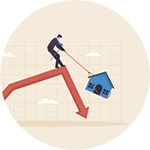Most Affordable Mortgage Rates in 2 Years
- 5-year mortgage fall to 4.3%, the lowest level seen in the last 2 years.
- May sales volume 33% lower than last year at 31,645 sales in England and Wales.
- HMRC's estimate for UK residential property transactions in August is 10% higher than last year (non-seasonally adjusted).
- Average house prices in England and Wales grew by 2% versus last year for July 2024 to £301,172.
- I expect to see stamp duty changes in the budget.
- Overpricing your home by 5% slows down the sale of your home by up to 6 weeks.
- The average price of a newly built home costs £444,504 in May 2024, up 25% on May 2023.
- UK Finance states the housing market needs reform.

The housing market bounces back as first-time buyers return
At last, we see a return to the pre-pandemic housing market as first-time buyers return. This is set to carry on with predicted interest rate easing, allowing homeowners to upsize. According to research by Savills, total spending on house purchases broke through the £350 billion barrier in the first half of 2024. The recovery was fuelled by £88.3 billion spent in April to June, an 8% increase on the same period in 2023.
The buzz for first-time buyers is far wider than just in the south, according to the Halifax. They state Manchester is the UK city with the greatest proportion of first-time buyers outside London. The supply and demand we reported in our August Report shows signs that the market is now in full swing during one of the busiest months of the year.
Overprice your home by 5% slows down the sale of your home by up to 6 weeks
Average house prices in England and Wales remain close to record highs of £301,172. However, the growth over the last year has become very static at only 2%. Home buyers are becoming far more price-sensitive, and sellers who overprice are seeing the downsides of getting this wrong. Zoopla reports that Homes that don't need to be reduced in price take 28 days to sell. But if you overprice by 5% or more, your property could be on the market for 73 days (6 weeks longer).
Labour's Angela Rayner is following through!
The continued growth of the housing market relies upon a steady flow of fresh housing stock. During their term, Labour pledged to Build 1.5 million new homes across England over the next 5 years. Angela's approach is to revolutionise the planning process for building on green belt land. Whilst 4 million new homes could be built on these sites, Landtech has calculated that around 800,000 new homes could be built across London and the South East alone. New builds drive both first-time buyers but also sell for the highest average price compared to resold homes.
October budget fears
It has been 2-years since the Liz Truss Budget, which started a very difficult time for the housing market, so getting it wrong has huge implications. Kier Starmar has been very clear that October's Budget will be "painful" and the government will have to make "big asks" of the public. But what does this mean? Will we see the Capital Gains Tax change to remove the different rates and charges at the income tax rate? An increase to the inheritance tax banding? The removal of the First-time buyer relief on properties up to £425,000.
I expect to see stamp duty changes in the budget; a give with one hand and take away with another. Keeping the first-time buyer relief until 2029 to align with their new build strategy, but lower the standard rate back to £125,000 for all non-first-time buyers. Potentially increasing the stamp duty for Non-UK residents to 2% (from 2%).
UK Finance states the housing market needs reform
A new report called Homes We Need published by UK Finance states that the UK’s housing market lacks affordable and suitable homes. Strong action is needed to support first-time buyers, renters and people looking to downsize.
In the report there is a call for the temporary nil-rate band for first-time buyers on stamp duty up to £425,000 to be made permanent, a review into whether prudential rules introduced after the global financial crisis have made getting a mortgage too tough, and for the minimising of up-front costs for those choosing to downsize, among with many other recommendations.

Will there be another base rate fall?
On the 19th of September, the Bank of England held the base rate at 5% after reducing it from 5.25% in their last meeting. The question as to whether we'll see another base rate change in 2024 is very much in the air. The next meetings are set for the 7th November and the 19th December.
The governor of the Bank of England, Andrew Bailey, has said interest rates will continue to be brought down slowly even as inflation comes under control. He further added that they are unlikely to return to the near-zero rates seen previously.
This is echoed by Megan Greene, who is an external member of the Bank of England’s Monetary Policy Committee, who has said that interest rate reductions may need to slow down amid concerns that consumers will begin spending more freely and push up inflation.
Inflation remained steady at 2.2% in August. However, it won't remain at this level for long. According to a Bank of England survey of company decision-makers in August, businesses expect inflation to be higher in a year. This means the BOE must combat this increased spending over the next year with increases to the base rate.
We should all prepare for regular adjustments to the base rate, both down and up!
Will mortgage rates go down in 2024?
In a recent Zoopla article, Nic Hopkirk suggests mortgage rates will stay at and around 4-4.5% for the rest of 2024 and the base rate will likely fall to 3.5% by the end of 2025.
Lowest May on record for property sales volume
England & Wales
Property sales volume fell by 33% fall year on year at 31,645 property sales in May. While these figures will increase once the Land Registry data is updated, sales volumes have fallen for the 18th consecutive month. HMRC's non-seasonally adjusted estimate for UK residential property transactions in August is 10% higher than the same month last year.
London 
London echoes the wider country, falling 32% year on year in May to 3,303, in the most recent data for registered properties released by the Land Registry. This is the 17th consecutive month of annual sales falls for London. For more on London, read: London Housing Market Report.
Average house prices in London remained static last year at £520,747 for July 2024.
Are UK house prices falling?
Average house prices in England & Wales rose year on year by 2% to £301,172 for July 2024. Rightmove is reporting that asking prices for homes rose at twice their long-term average pace this month, reaching an average of £370,759 in the four weeks to mid-September.
Mortgage approval reports
Home buyers
Mortgage approvals for home buyers grew in July to 61,985, up by 21% on last year. The increased supply and demand shows in the number of buyers needing mortgages.
Best rates for 2-Year Mortgage Deal
Two-year fixed mortgage rates are falling faster than longer-term deals as markets price in expectations for interest rate cuts from the Bank of England, making short-dated mortgage deals increasingly competitive.
According to the Bank of England data, 5-year deals also saw a marked fall to 4.3%. This is the lowest level seen in the last 2 years.
Remortgages
The remortgage growth was less confident than for home buyers, with a 56% YOY fall to 25,111 mortgage approvals. I predict many homeowners cannot afford the high mortgage interest rates available now at 4.7+% and above when they took mortgages out with rates at 1-2% a few years ago. This leaves many homeowners trapped in mortgages they're struggling to pay. Unless mortgage rates become more affordable over the next year, or they may be forced to sell.
How many new build properties are being built?
New Build prices hit record high
The average price of a new build in England and Wales rose to £444,504 in May 2024, up 25% on last year and setting a new record high. Buying a new build costs £94,451 more than an average-priced property.


Andrew Boast FMAAT
CEO of SAM Conveyancing
The housing market is in full swing with a hub of activity from first-time buyers. I hope the budget on the 30th of October keeps the momentum moving forward with plenty of new build targets to beat the current lacklustre levels in 2024 - and No Liz Truss fiascos!
What we don't want to see is a budget that slows the housing market down, although I predict stamp duty will play a massive part in this announcement, especially around the extension of the first-time buyer relief.
One thing is for sure: managing inflation spikes without needing to change the Bank of England base rate upward will help create confidence in the mortgage market, which will mean more affordable mortgage rates.
Sources: Latest data from - Gov.UK, Bank of England, UK House Price Index, ONS and Property Mark (NAEA).

Without Killing Anyone
This book could be the difference between every mover’s dream, buying and moving into your new home stress free, or, stress, missed deadlines, legal disasters, building defects, and possibly the collapse of the whole transaction. (Costing you a small fortune, a head full of grey hairs, and, driving you to threaten the life of your solicitor, lender, co-owners, family, partner, or some combination of all five).
With more than two decades’ experience in the conveyancing sector and over 50,000 successful client moves under his belt, Andrew shares insider tips and advice to empower you as a buyer, giving you the tools to make the best decisions for your circumstances and ease the chaos.
Available on Amazon | Kindle | Paperback












